Home Care Nurse Resume Examples

Jul 18, 2024
|
12 min read
"Craft a standout home care nurse resume: Tips to show you care and land the job you deserve"
Rated by 348 people
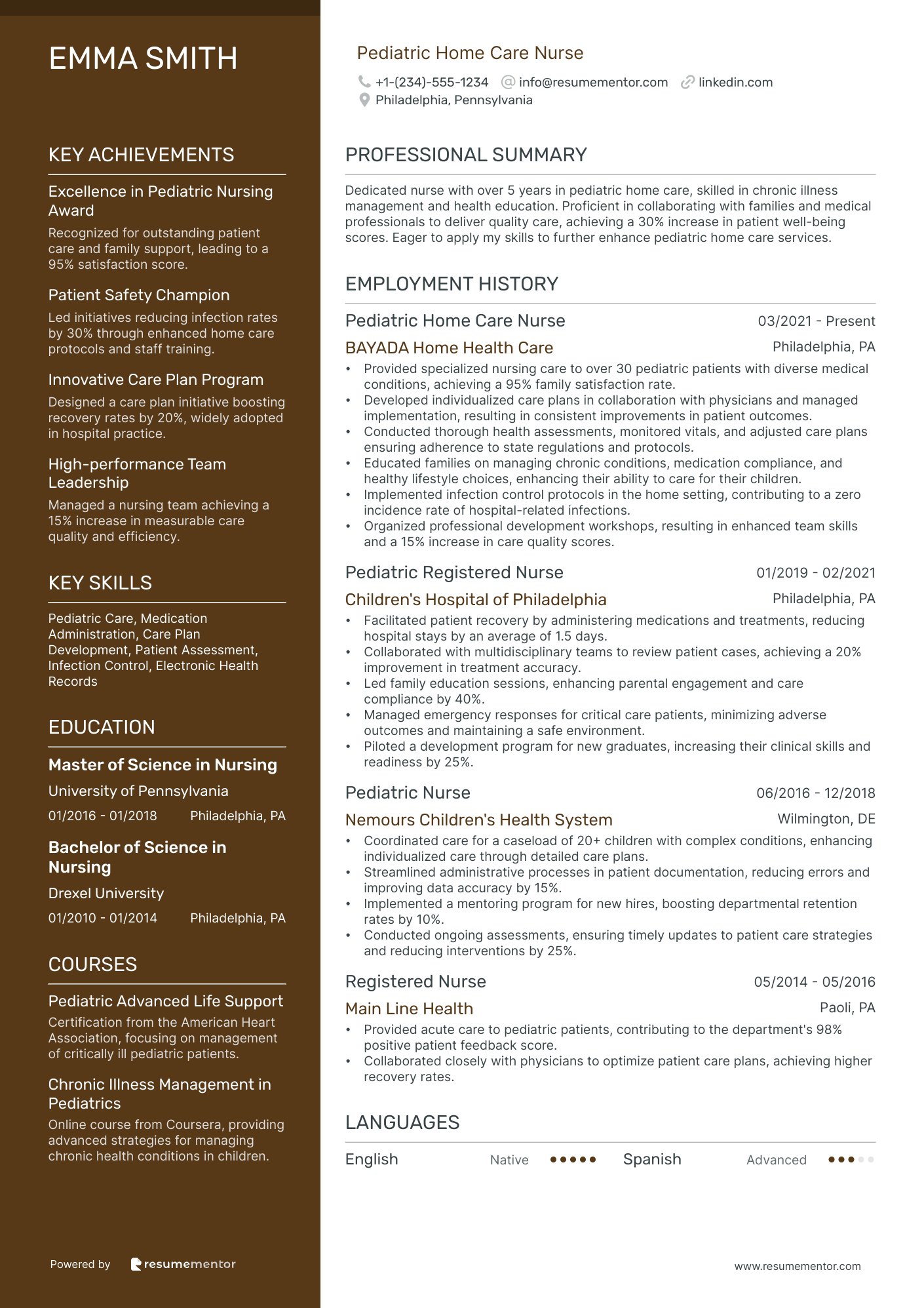
Pediatric Home Care Nurse
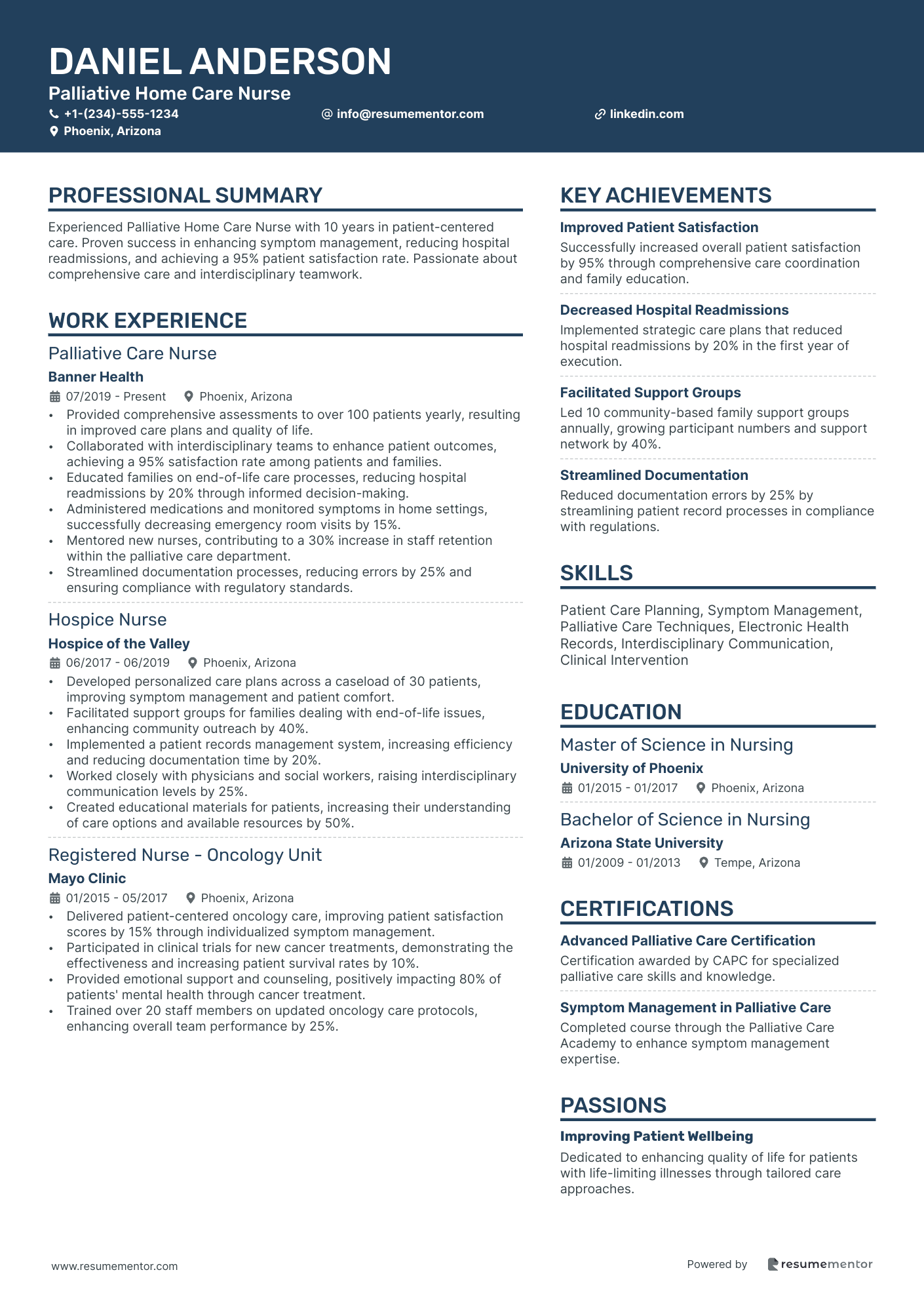
Palliative Home Care Nurse
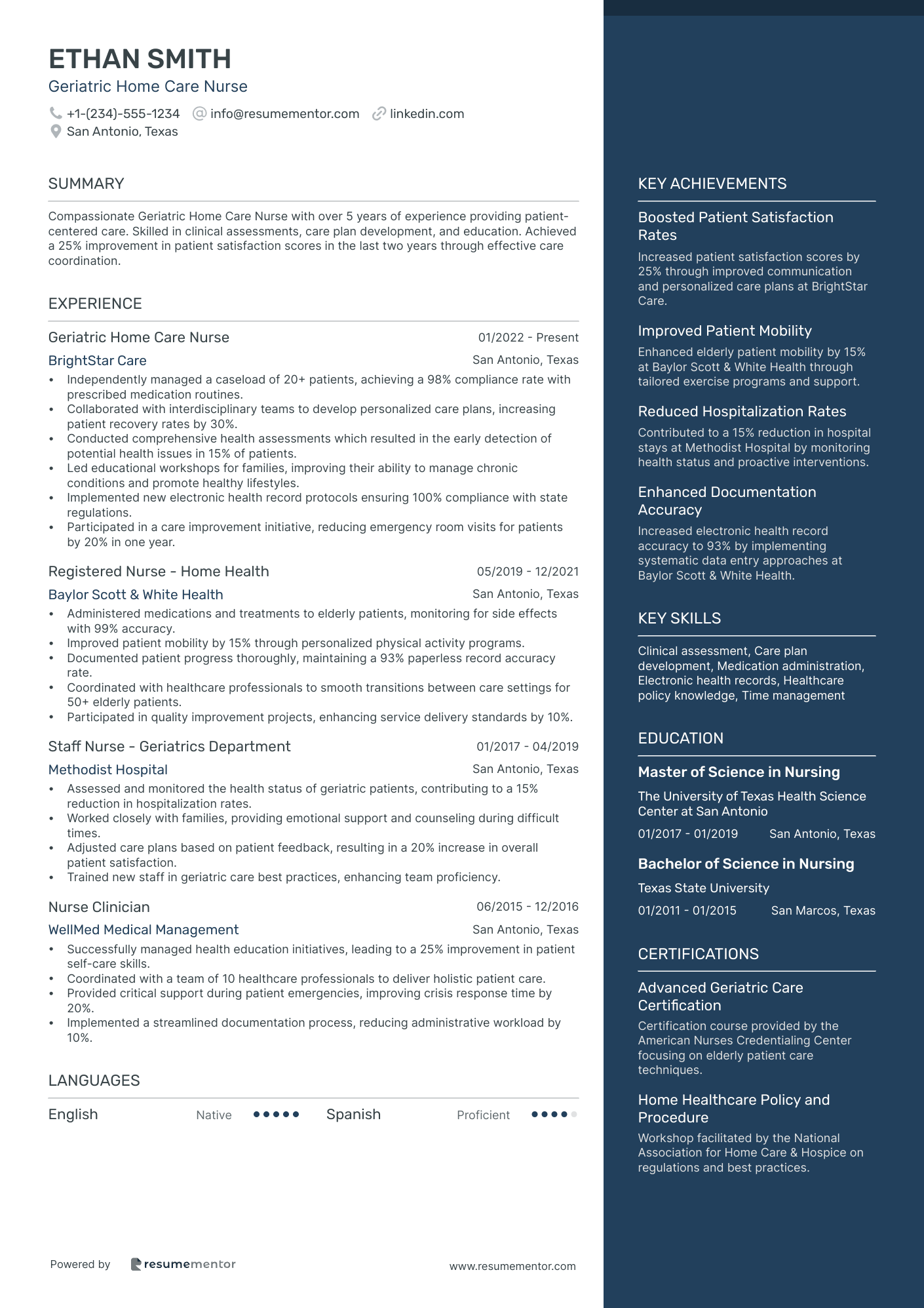
Geriatric Home Care Nurse
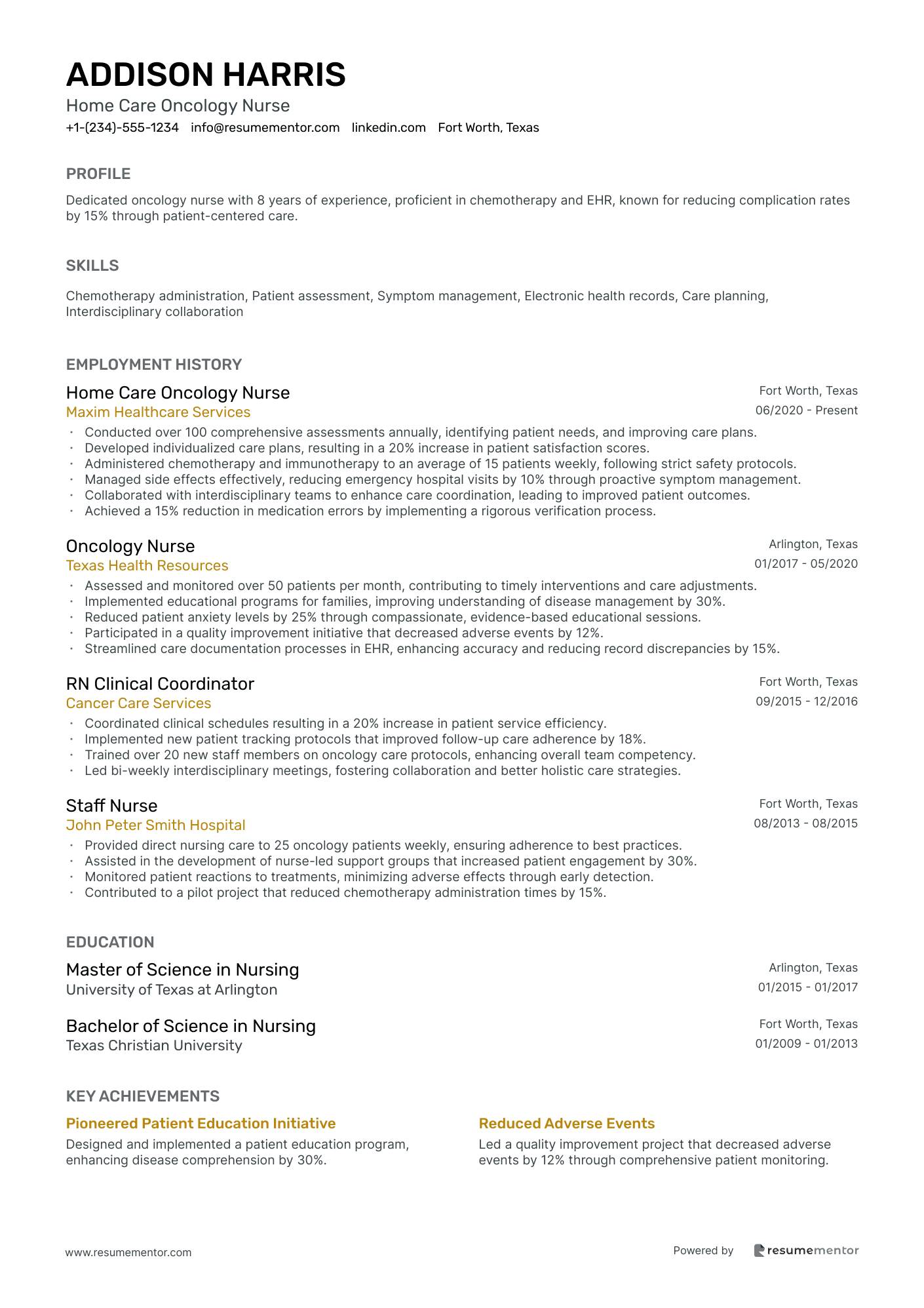
Home Care Oncology Nurse
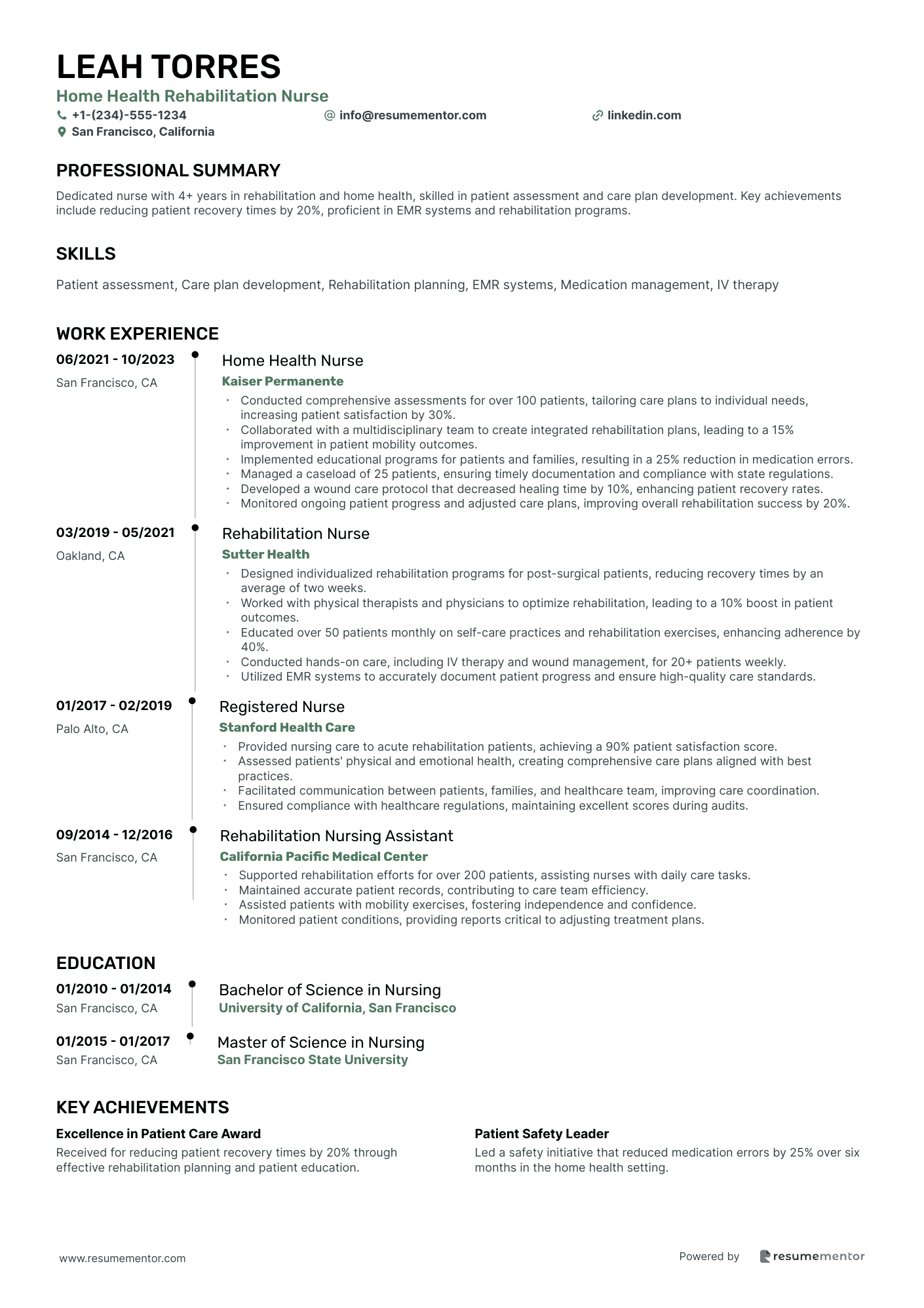
Home Health Rehabilitation Nurse
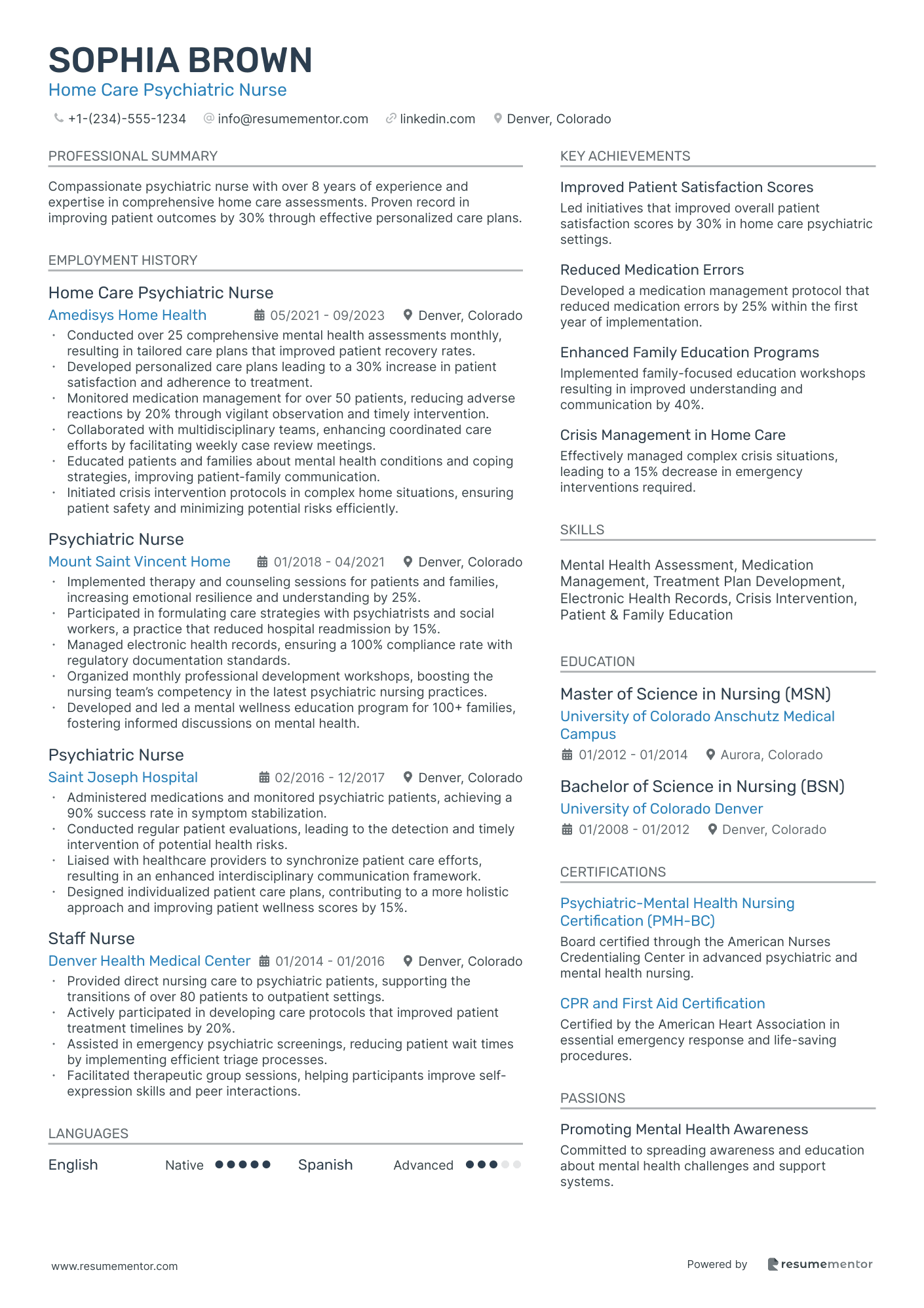
Home Care Psychiatric Nurse
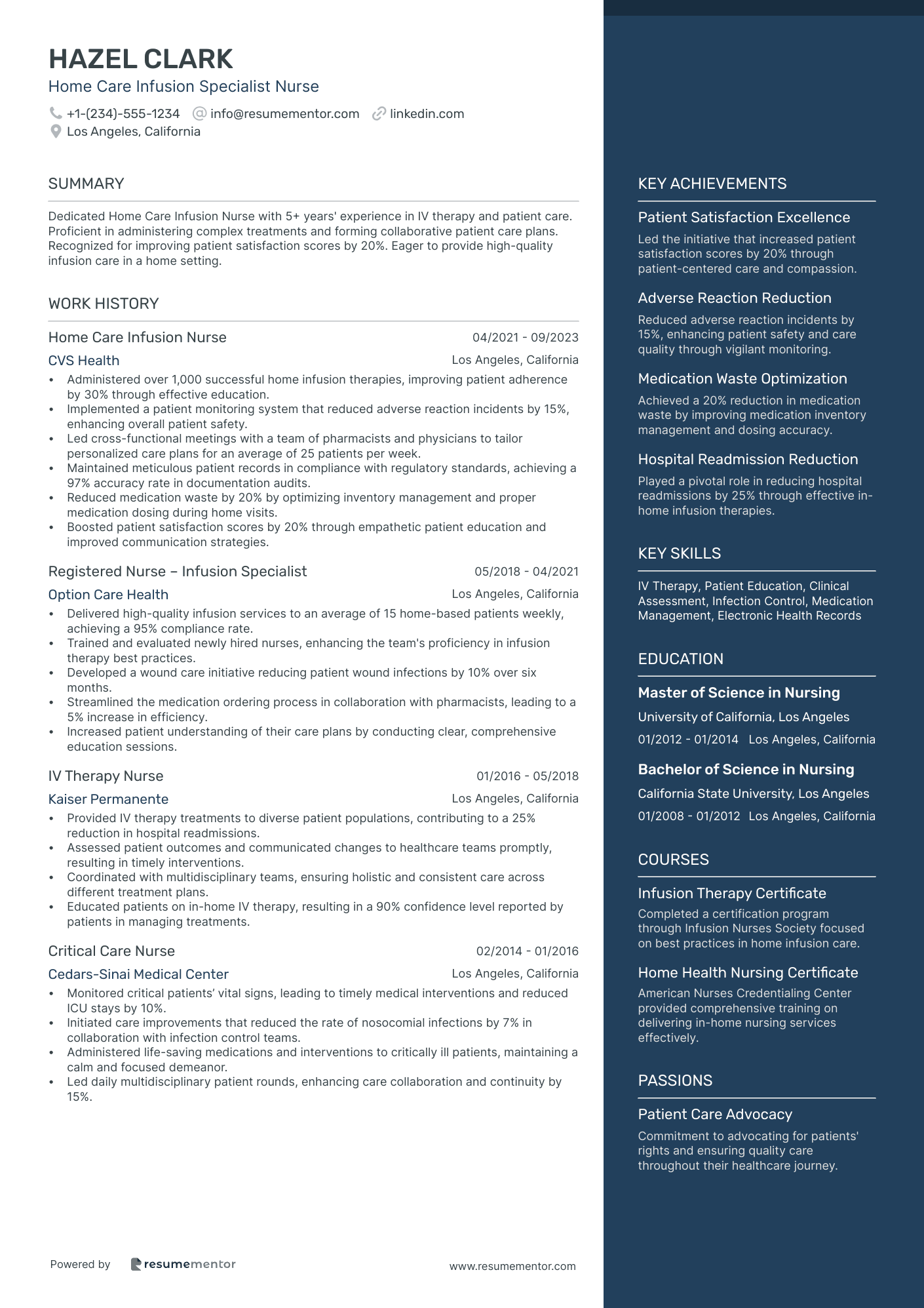
Home Care Infusion Specialist Nurse
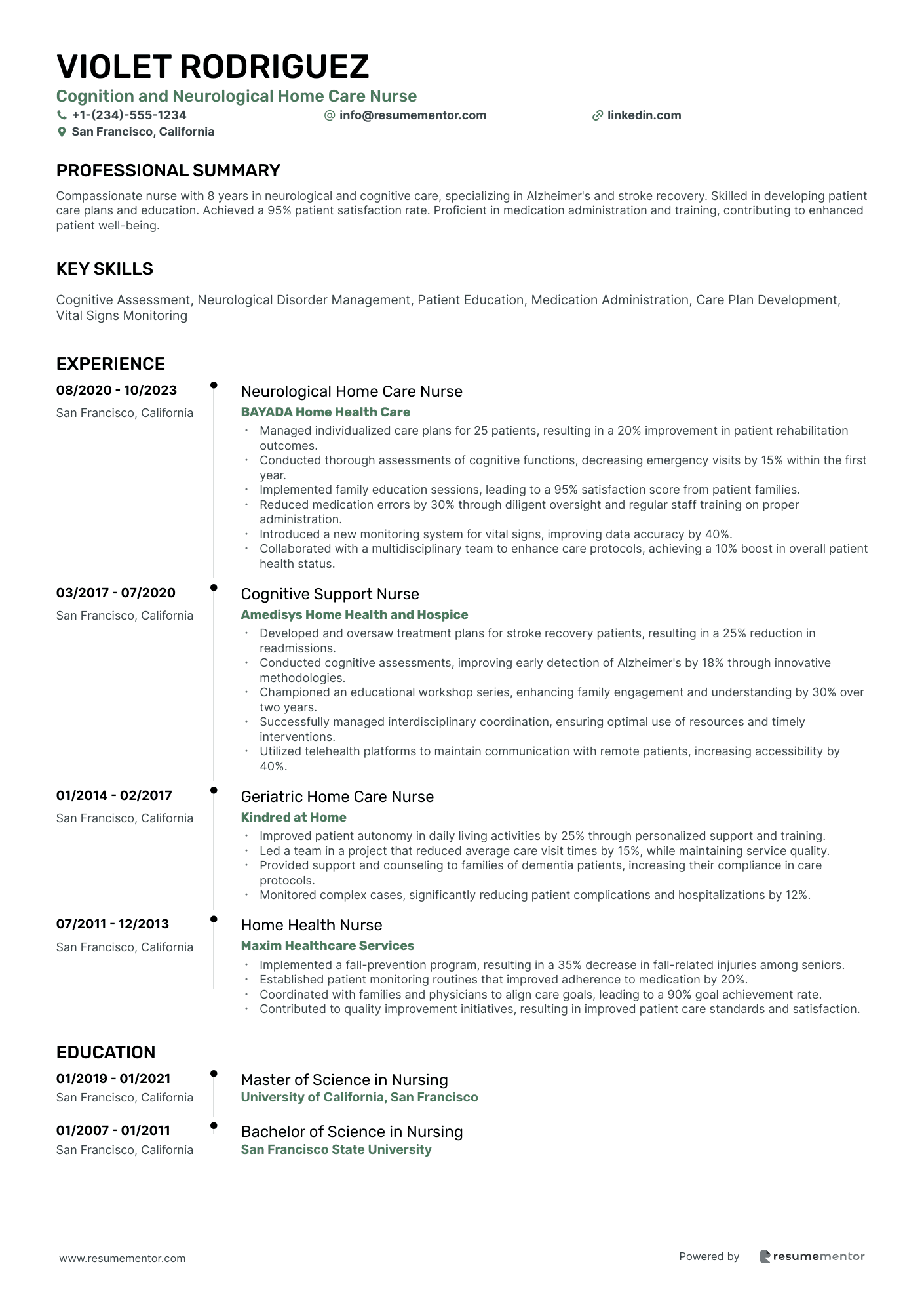
Cognition and Neurological Home Care Nurse
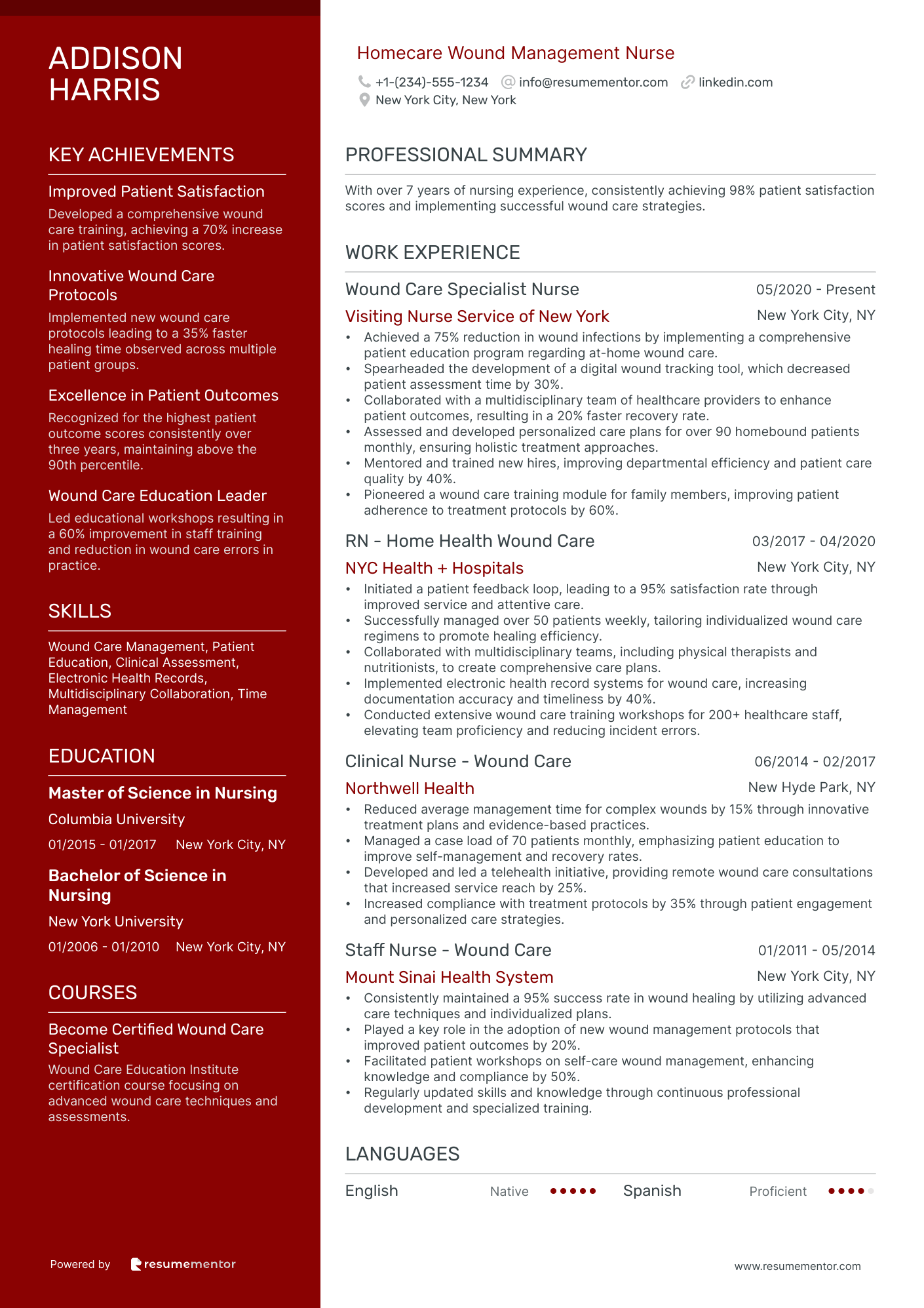
Homecare Wound Management Nurse
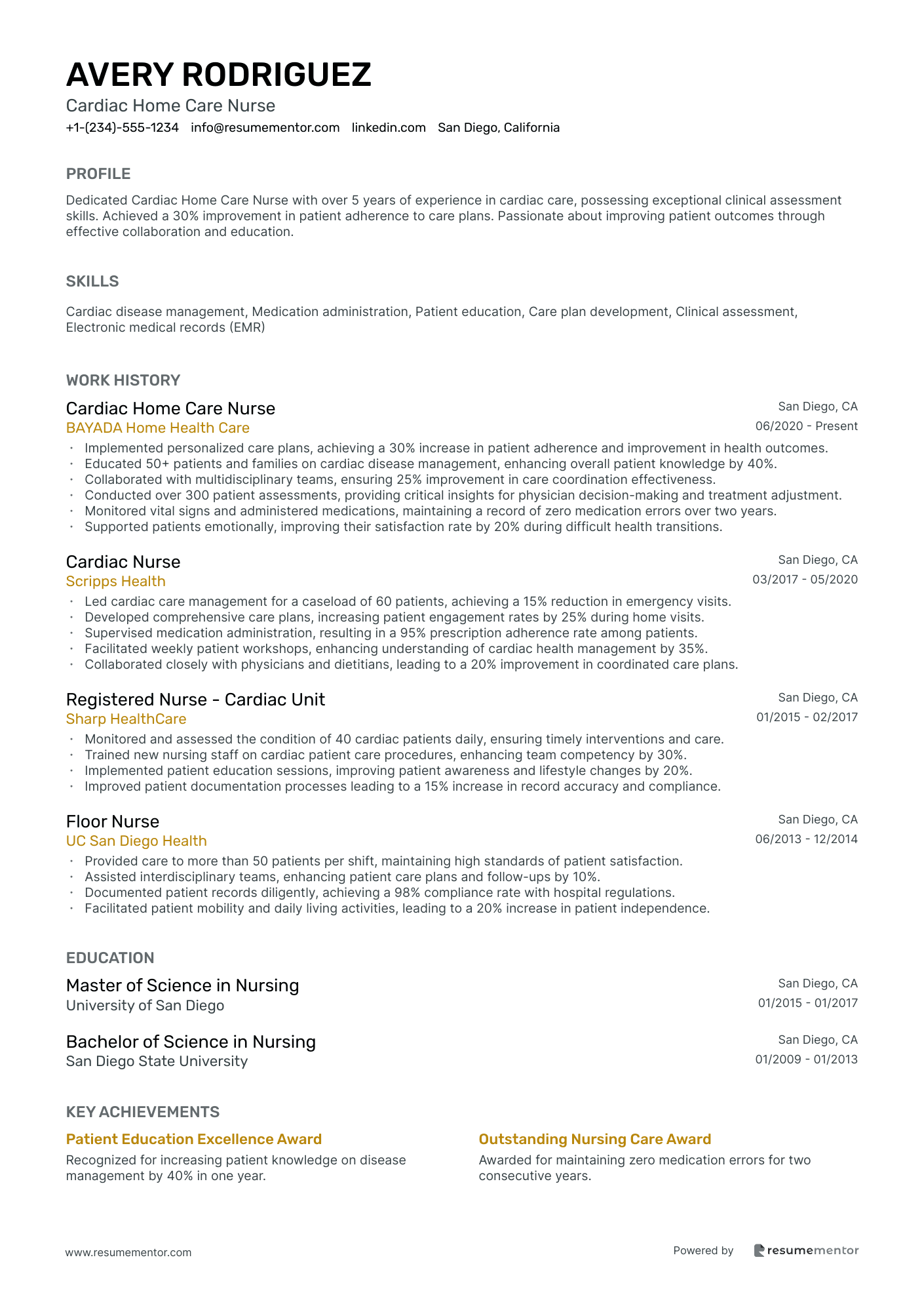
Cardiac Home Care Nurse

Pediatric Home Care Nurse resume sample
- •Provided specialized nursing care to over 30 pediatric patients with diverse medical conditions, achieving a 95% family satisfaction rate.
- •Developed individualized care plans in collaboration with physicians and managed implementation, resulting in consistent improvements in patient outcomes.
- •Conducted thorough health assessments, monitored vitals, and adjusted care plans ensuring adherence to state regulations and protocols.
- •Educated families on managing chronic conditions, medication compliance, and healthy lifestyle choices, enhancing their ability to care for their children.
- •Implemented infection control protocols in the home setting, contributing to a zero incidence rate of hospital-related infections.
- •Organized professional development workshops, resulting in enhanced team skills and a 15% increase in care quality scores.
- •Facilitated patient recovery by administering medications and treatments, reducing hospital stays by an average of 1.5 days.
- •Collaborated with multidisciplinary teams to review patient cases, achieving a 20% improvement in treatment accuracy.
- •Led family education sessions, enhancing parental engagement and care compliance by 40%.
- •Managed emergency responses for critical care patients, minimizing adverse outcomes and maintaining a safe environment.
- •Piloted a development program for new graduates, increasing their clinical skills and readiness by 25%.
- •Coordinated care for a caseload of 20+ children with complex conditions, enhancing individualized care through detailed care plans.
- •Streamlined administrative processes in patient documentation, reducing errors and improving data accuracy by 15%.
- •Implemented a mentoring program for new hires, boosting departmental retention rates by 10%.
- •Conducted ongoing assessments, ensuring timely updates to patient care strategies and reducing interventions by 25%.
- •Provided acute care to pediatric patients, contributing to the department's 98% positive patient feedback score.
- •Collaborated closely with physicians to optimize patient care plans, achieving higher recovery rates.
Palliative Home Care Nurse resume sample
- •Provided comprehensive assessments to over 100 patients yearly, resulting in improved care plans and quality of life.
- •Collaborated with interdisciplinary teams to enhance patient outcomes, achieving a 95% satisfaction rate among patients and families.
- •Educated families on end-of-life care processes, reducing hospital readmissions by 20% through informed decision-making.
- •Administered medications and monitored symptoms in home settings, successfully decreasing emergency room visits by 15%.
- •Mentored new nurses, contributing to a 30% increase in staff retention within the palliative care department.
- •Streamlined documentation processes, reducing errors by 25% and ensuring compliance with regulatory standards.
- •Developed personalized care plans across a caseload of 30 patients, improving symptom management and patient comfort.
- •Facilitated support groups for families dealing with end-of-life issues, enhancing community outreach by 40%.
- •Implemented a patient records management system, increasing efficiency and reducing documentation time by 20%.
- •Worked closely with physicians and social workers, raising interdisciplinary communication levels by 25%.
- •Created educational materials for patients, increasing their understanding of care options and available resources by 50%.
- •Delivered patient-centered oncology care, improving patient satisfaction scores by 15% through individualized symptom management.
- •Participated in clinical trials for new cancer treatments, demonstrating the effectiveness and increasing patient survival rates by 10%.
- •Provided emotional support and counseling, positively impacting 80% of patients' mental health through cancer treatment.
- •Trained over 20 staff members on updated oncology care protocols, enhancing overall team performance by 25%.
- •Administered direct care to 15-20 patients daily, enhancing recovery times and patient outcomes through precise clinical interventions.
- •Supported the implementation of a new EHR system, increasing documentation accuracy and reducing staff time on paperwork by 20%.
- •Collaborated with a multidisciplinary team to optimize care delivery, resulting in a 10% decrease in care discrepancies.
- •Organized training sessions, improving nursing staff proficiency and reducing procedural errors by 15%.
Geriatric Home Care Nurse resume sample
- •Independently managed a caseload of 20+ patients, achieving a 98% compliance rate with prescribed medication routines.
- •Collaborated with interdisciplinary teams to develop personalized care plans, increasing patient recovery rates by 30%.
- •Conducted comprehensive health assessments which resulted in the early detection of potential health issues in 15% of patients.
- •Led educational workshops for families, improving their ability to manage chronic conditions and promote healthy lifestyles.
- •Implemented new electronic health record protocols ensuring 100% compliance with state regulations.
- •Participated in a care improvement initiative, reducing emergency room visits for patients by 20% in one year.
- •Administered medications and treatments to elderly patients, monitoring for side effects with 99% accuracy.
- •Improved patient mobility by 15% through personalized physical activity programs.
- •Documented patient progress thoroughly, maintaining a 93% paperless record accuracy rate.
- •Coordinated with healthcare professionals to smooth transitions between care settings for 50+ elderly patients.
- •Participated in quality improvement projects, enhancing service delivery standards by 10%.
- •Assessed and monitored the health status of geriatric patients, contributing to a 15% reduction in hospitalization rates.
- •Worked closely with families, providing emotional support and counseling during difficult times.
- •Adjusted care plans based on patient feedback, resulting in a 20% increase in overall patient satisfaction.
- •Trained new staff in geriatric care best practices, enhancing team proficiency.
- •Successfully managed health education initiatives, leading to a 25% improvement in patient self-care skills.
- •Coordinated with a team of 10 healthcare professionals to deliver holistic patient care.
- •Provided critical support during patient emergencies, improving crisis response time by 20%.
- •Implemented a streamlined documentation process, reducing administrative workload by 10%.
Home Care Oncology Nurse resume sample
- •Conducted over 100 comprehensive assessments annually, identifying patient needs, and improving care plans.
- •Developed individualized care plans, resulting in a 20% increase in patient satisfaction scores.
- •Administered chemotherapy and immunotherapy to an average of 15 patients weekly, following strict safety protocols.
- •Managed side effects effectively, reducing emergency hospital visits by 10% through proactive symptom management.
- •Collaborated with interdisciplinary teams to enhance care coordination, leading to improved patient outcomes.
- •Achieved a 15% reduction in medication errors by implementing a rigorous verification process.
- •Assessed and monitored over 50 patients per month, contributing to timely interventions and care adjustments.
- •Implemented educational programs for families, improving understanding of disease management by 30%.
- •Reduced patient anxiety levels by 25% through compassionate, evidence-based educational sessions.
- •Participated in a quality improvement initiative that decreased adverse events by 12%.
- •Streamlined care documentation processes in EHR, enhancing accuracy and reducing record discrepancies by 15%.
- •Coordinated clinical schedules resulting in a 20% increase in patient service efficiency.
- •Implemented new patient tracking protocols that improved follow-up care adherence by 18%.
- •Trained over 20 new staff members on oncology care protocols, enhancing overall team competency.
- •Led bi-weekly interdisciplinary meetings, fostering collaboration and better holistic care strategies.
- •Provided direct nursing care to 25 oncology patients weekly, ensuring adherence to best practices.
- •Assisted in the development of nurse-led support groups that increased patient engagement by 30%.
- •Monitored patient reactions to treatments, minimizing adverse effects through early detection.
- •Contributed to a pilot project that reduced chemotherapy administration times by 15%.
Home Health Rehabilitation Nurse resume sample
- •Conducted comprehensive assessments for over 100 patients, tailoring care plans to individual needs, increasing patient satisfaction by 30%.
- •Collaborated with a multidisciplinary team to create integrated rehabilitation plans, leading to a 15% improvement in patient mobility outcomes.
- •Implemented educational programs for patients and families, resulting in a 25% reduction in medication errors.
- •Managed a caseload of 25 patients, ensuring timely documentation and compliance with state regulations.
- •Developed a wound care protocol that decreased healing time by 10%, enhancing patient recovery rates.
- •Monitored ongoing patient progress and adjusted care plans, improving overall rehabilitation success by 20%.
- •Designed individualized rehabilitation programs for post-surgical patients, reducing recovery times by an average of two weeks.
- •Worked with physical therapists and physicians to optimize rehabilitation, leading to a 10% boost in patient outcomes.
- •Educated over 50 patients monthly on self-care practices and rehabilitation exercises, enhancing adherence by 40%.
- •Conducted hands-on care, including IV therapy and wound management, for 20+ patients weekly.
- •Utilized EMR systems to accurately document patient progress and ensure high-quality care standards.
- •Provided nursing care to acute rehabilitation patients, achieving a 90% patient satisfaction score.
- •Assessed patients' physical and emotional health, creating comprehensive care plans aligned with best practices.
- •Facilitated communication between patients, families, and healthcare team, improving care coordination.
- •Ensured compliance with healthcare regulations, maintaining excellent scores during audits.
- •Supported rehabilitation efforts for over 200 patients, assisting nurses with daily care tasks.
- •Maintained accurate patient records, contributing to care team efficiency.
- •Assisted patients with mobility exercises, fostering independence and confidence.
- •Monitored patient conditions, providing reports critical to adjusting treatment plans.
Home Care Psychiatric Nurse resume sample
- •Conducted over 25 comprehensive mental health assessments monthly, resulting in tailored care plans that improved patient recovery rates.
- •Developed personalized care plans leading to a 30% increase in patient satisfaction and adherence to treatment.
- •Monitored medication management for over 50 patients, reducing adverse reactions by 20% through vigilant observation and timely intervention.
- •Collaborated with multidisciplinary teams, enhancing coordinated care efforts by facilitating weekly case review meetings.
- •Educated patients and families about mental health conditions and coping strategies, improving patient-family communication.
- •Initiated crisis intervention protocols in complex home situations, ensuring patient safety and minimizing potential risks efficiently.
- •Implemented therapy and counseling sessions for patients and families, increasing emotional resilience and understanding by 25%.
- •Participated in formulating care strategies with psychiatrists and social workers, a practice that reduced hospital readmission by 15%.
- •Managed electronic health records, ensuring a 100% compliance rate with regulatory documentation standards.
- •Organized monthly professional development workshops, boosting the nursing team’s competency in the latest psychiatric nursing practices.
- •Developed and led a mental wellness education program for 100+ families, fostering informed discussions on mental health.
- •Administered medications and monitored psychiatric patients, achieving a 90% success rate in symptom stabilization.
- •Conducted regular patient evaluations, leading to the detection and timely intervention of potential health risks.
- •Liaised with healthcare providers to synchronize patient care efforts, resulting in an enhanced interdisciplinary communication framework.
- •Designed individualized patient care plans, contributing to a more holistic approach and improving patient wellness scores by 15%.
- •Provided direct nursing care to psychiatric patients, supporting the transitions of over 80 patients to outpatient settings.
- •Actively participated in developing care protocols that improved patient treatment timelines by 20%.
- •Assisted in emergency psychiatric screenings, reducing patient wait times by implementing efficient triage processes.
- •Facilitated therapeutic group sessions, helping participants improve self-expression skills and peer interactions.
Home Care Infusion Specialist Nurse resume sample
- •Administered over 1,000 successful home infusion therapies, improving patient adherence by 30% through effective education.
- •Implemented a patient monitoring system that reduced adverse reaction incidents by 15%, enhancing overall patient safety.
- •Led cross-functional meetings with a team of pharmacists and physicians to tailor personalized care plans for an average of 25 patients per week.
- •Maintained meticulous patient records in compliance with regulatory standards, achieving a 97% accuracy rate in documentation audits.
- •Reduced medication waste by 20% by optimizing inventory management and proper medication dosing during home visits.
- •Boosted patient satisfaction scores by 20% through empathetic patient education and improved communication strategies.
- •Delivered high-quality infusion services to an average of 15 home-based patients weekly, achieving a 95% compliance rate.
- •Trained and evaluated newly hired nurses, enhancing the team's proficiency in infusion therapy best practices.
- •Developed a wound care initiative reducing patient wound infections by 10% over six months.
- •Streamlined the medication ordering process in collaboration with pharmacists, leading to a 5% increase in efficiency.
- •Increased patient understanding of their care plans by conducting clear, comprehensive education sessions.
- •Provided IV therapy treatments to diverse patient populations, contributing to a 25% reduction in hospital readmissions.
- •Assessed patient outcomes and communicated changes to healthcare teams promptly, resulting in timely interventions.
- •Coordinated with multidisciplinary teams, ensuring holistic and consistent care across different treatment plans.
- •Educated patients on in-home IV therapy, resulting in a 90% confidence level reported by patients in managing treatments.
- •Monitored critical patients’ vital signs, leading to timely medical interventions and reduced ICU stays by 10%.
- •Initiated care improvements that reduced the rate of nosocomial infections by 7% in collaboration with infection control teams.
- •Administered life-saving medications and interventions to critically ill patients, maintaining a calm and focused demeanor.
- •Led daily multidisciplinary patient rounds, enhancing care collaboration and continuity by 15%.
Cognition and Neurological Home Care Nurse resume sample
- •Managed individualized care plans for 25 patients, resulting in a 20% improvement in patient rehabilitation outcomes.
- •Conducted thorough assessments of cognitive functions, decreasing emergency visits by 15% within the first year.
- •Implemented family education sessions, leading to a 95% satisfaction score from patient families.
- •Reduced medication errors by 30% through diligent oversight and regular staff training on proper administration.
- •Introduced a new monitoring system for vital signs, improving data accuracy by 40%.
- •Collaborated with a multidisciplinary team to enhance care protocols, achieving a 10% boost in overall patient health status.
- •Developed and oversaw treatment plans for stroke recovery patients, resulting in a 25% reduction in readmissions.
- •Conducted cognitive assessments, improving early detection of Alzheimer's by 18% through innovative methodologies.
- •Championed an educational workshop series, enhancing family engagement and understanding by 30% over two years.
- •Successfully managed interdisciplinary coordination, ensuring optimal use of resources and timely interventions.
- •Utilized telehealth platforms to maintain communication with remote patients, increasing accessibility by 40%.
- •Improved patient autonomy in daily living activities by 25% through personalized support and training.
- •Led a team in a project that reduced average care visit times by 15%, while maintaining service quality.
- •Provided support and counseling to families of dementia patients, increasing their compliance in care protocols.
- •Monitored complex cases, significantly reducing patient complications and hospitalizations by 12%.
- •Implemented a fall-prevention program, resulting in a 35% decrease in fall-related injuries among seniors.
- •Established patient monitoring routines that improved adherence to medication by 20%.
- •Coordinated with families and physicians to align care goals, leading to a 90% goal achievement rate.
- •Contributed to quality improvement initiatives, resulting in improved patient care standards and satisfaction.
Homecare Wound Management Nurse resume sample
- •Achieved a 75% reduction in wound infections by implementing a comprehensive patient education program regarding at-home wound care.
- •Spearheaded the development of a digital wound tracking tool, which decreased patient assessment time by 30%.
- •Collaborated with a multidisciplinary team of healthcare providers to enhance patient outcomes, resulting in a 20% faster recovery rate.
- •Assessed and developed personalized care plans for over 90 homebound patients monthly, ensuring holistic treatment approaches.
- •Mentored and trained new hires, improving departmental efficiency and patient care quality by 40%.
- •Pioneered a wound care training module for family members, improving patient adherence to treatment protocols by 60%.
- •Initiated a patient feedback loop, leading to a 95% satisfaction rate through improved service and attentive care.
- •Successfully managed over 50 patients weekly, tailoring individualized wound care regimens to promote healing efficiency.
- •Collaborated with multidisciplinary teams, including physical therapists and nutritionists, to create comprehensive care plans.
- •Implemented electronic health record systems for wound care, increasing documentation accuracy and timeliness by 40%.
- •Conducted extensive wound care training workshops for 200+ healthcare staff, elevating team proficiency and reducing incident errors.
- •Reduced average management time for complex wounds by 15% through innovative treatment plans and evidence-based practices.
- •Managed a case load of 70 patients monthly, emphasizing patient education to improve self-management and recovery rates.
- •Developed and led a telehealth initiative, providing remote wound care consultations that increased service reach by 25%.
- •Increased compliance with treatment protocols by 35% through patient engagement and personalized care strategies.
- •Consistently maintained a 95% success rate in wound healing by utilizing advanced care techniques and individualized plans.
- •Played a key role in the adoption of new wound management protocols that improved patient outcomes by 20%.
- •Facilitated patient workshops on self-care wound management, enhancing knowledge and compliance by 50%.
- •Regularly updated skills and knowledge through continuous professional development and specialized training.
Cardiac Home Care Nurse resume sample
- •Implemented personalized care plans, achieving a 30% increase in patient adherence and improvement in health outcomes.
- •Educated 50+ patients and families on cardiac disease management, enhancing overall patient knowledge by 40%.
- •Collaborated with multidisciplinary teams, ensuring 25% improvement in care coordination effectiveness.
- •Conducted over 300 patient assessments, providing critical insights for physician decision-making and treatment adjustment.
- •Monitored vital signs and administered medications, maintaining a record of zero medication errors over two years.
- •Supported patients emotionally, improving their satisfaction rate by 20% during difficult health transitions.
- •Led cardiac care management for a caseload of 60 patients, achieving a 15% reduction in emergency visits.
- •Developed comprehensive care plans, increasing patient engagement rates by 25% during home visits.
- •Supervised medication administration, resulting in a 95% prescription adherence rate among patients.
- •Facilitated weekly patient workshops, enhancing understanding of cardiac health management by 35%.
- •Collaborated closely with physicians and dietitians, leading to a 20% improvement in coordinated care plans.
- •Monitored and assessed the condition of 40 cardiac patients daily, ensuring timely interventions and care.
- •Trained new nursing staff on cardiac patient care procedures, enhancing team competency by 30%.
- •Implemented patient education sessions, improving patient awareness and lifestyle changes by 20%.
- •Improved patient documentation processes leading to a 15% increase in record accuracy and compliance.
- •Provided care to more than 50 patients per shift, maintaining high standards of patient satisfaction.
- •Assisted interdisciplinary teams, enhancing patient care plans and follow-ups by 10%.
- •Documented patient records diligently, achieving a 98% compliance rate with hospital regulations.
- •Facilitated patient mobility and daily living activities, leading to a 20% increase in patient independence.
As a home care nurse, guiding patients through their health journeys is second nature, like a lighthouse guiding ships through a storm. Yet, when it comes to writing a resume, the path may not be as clear. Crafting a resume that captures your medical expertise and your compassionate care can be challenging in a competitive job market.
Your resume is your opportunity to stand out, both in its content and its format. Using a clear resume template brings structure to your skills and experience, making your profile shine. This approach ensures that your nurturing nature and clinical skills aren't lost but stand out to employers.
Each experience and skill on your resume should weave a story of your dedication and patient care. A structured template helps present your accomplishments and qualifications cohesively, allowing employers to easily see why you’re the right fit for the role.
Think of your resume as more than a list; it is a window into your professional world. It shows how your hands-on care and empathetic heart are vital in nursing. By crafting a resume that truly reflects your abilities, you set the stage for new opportunities in home care nursing.
Key Takeaways
- Choose a clear resume template to highlight your medical expertise and compassionate care, making your profile stand out to employers.
- Your resume should narrate each experience and skill, creating a cohesive story of your dedication to patient care.
- Select a chronological resume format to effectively present your steady nursing career and growth.
- Emphasize achievements using action words and quantify your impact with clear metrics to demonstrate your skills and accomplishments.
- Include extra sections like language proficiency, hobbies, and volunteer work to offer a well-rounded view of your qualifications and interests.
What to focus on when writing your home care nurse resume
A home care nurse resume should clearly convey your healthcare skills and dedication to patient care, making it easy for a recruiter to see your potential fit for their team. Start by highlighting your experience in providing compassionate, high-quality care directly in patients' homes. It's important to use straightforward language that demonstrates your ability to perform clinical duties while ensuring patient comfort and safety.
How to structure your home care nurse resume
- Contact Information — This is where your resume begins, setting the tone for professionalism. Include your full name, phone number, and email address, as these are essential for immediate contact. Adding a LinkedIn profile can enhance your credibility, especially if it showcases your nursing journey. Make this section clearly visible and double-check for accuracy, as small errors here can lead to missed opportunities.
- Professional Summary — This section acts like your opening statement, catching the recruiter’s attention with a snapshot of your career. Craft a short, compelling description that speaks to your experience, significant skills, and passion for home care nursing. Mention any specialized areas you excel in, like wound care or managing chronic diseases, to show the depth of your expertise and how it aligns with the job you’re applying for.
- Experience — Presenting your work history is your chance to prove your capabilities in real-world settings. Start with the most recent or relevant roles and provide essential details such as job titles, employers, locations, and dates. Highlight specific responsibilities or accomplishments that demonstrate your dedication to patient-centered care. Use bullet points to make this section easy to read and help key achievements stand out.
- Education — Your educational background provides the foundation for your nursing career. Include your degree, the institution where you studied, and your graduation year. It's beneficial to mention any specialized training or coursework that directly relates to home care to underscore your preparedness for the role. This connection helps paint a picture of how your academics support your professional expertise.
- Licenses and Certifications — This section reinforces your qualifications with proof of licensure and certifications. State your nursing license details, including the number and expiration date, showing recruiters you are ready to practice immediately. Certifications like Basic Life Support (BLS) or Advanced Cardiovascular Life Support (ACLS) can highlight your commitment to maintaining high standards of care, boosting your appeal to potential employers.
- Skills — Your skill set is a critical part of your professional toolkit. Focus on both clinical skills, like patient assessment and medication administration, and indispensable soft skills, like empathy and effective communication. These skills are essential for building trust and rapport with patients and their families, setting the stage for long-lasting professional relationships.
As you consider these sections, it's important to think about the overall resume format to ensure everything is presented clearly and professionally — below, we will delve deeper into each section to help you create a standout resume for a home care nurse position.
Which resume format to choose
As a home care nurse, choosing the best resume format is key to presenting your qualifications effectively. A chronological format is ideal if you've built a steady career in nursing, as it allows potential employers to track your professional growth and experience in a straightforward way. Keep your design clean and uncomplicated to help your skills and achievements stand out. Opt for modern fonts like Raleway, Lato, or Montserrat, as these provide a fresh and professional look without overwhelming the content of your resume.
Always save your resume as a PDF to ensure consistency in formatting across different devices, which is crucial in presenting a polished image to prospective employers. Set your margins to one inch on all sides; this spacing gives your resume a neat and organized appearance, making it approachable and easy to navigate. Paying attention to these details will help you create a resume that catches the eye of hiring managers in the healthcare field and clearly communicates your capabilities as a home care nurse.
How to write a quantifiable resume experience section
Building a strong home care nurse resume experience section requires clearly showcasing your impact and skills. Start by using action words like "coordinated," "administered," "enhanced," and "monitored" to highlight your proactive approach to care. Tailor your resume to align with each job ad, honing in on the specific skills and competencies emphasized by the employer to make them stand out in your entries. Craft concise bullet points that demonstrate your successes with clear metrics, such as patient outcomes and satisfaction rates, to show your effectiveness. Organize your experience chronologically, beginning with the most recent role, generally including the last 10-15 years, or focusing on positions most relevant to the role for which you are applying. Choose job titles that showcase your career growth and deep expertise in the field.
- •Reduced patient hospital readmission rates by 25% through focused care plans and follow-up.
- •Boosted patient satisfaction scores 30% by implementing a personalized care communication system.
- •Trained 15 new home care aides, increasing team efficiency and patient coverage by 40%.
- •Administered medications and treatments to 20+ patients daily, ensuring protocols were met.
This experience section effectively highlights a series of achievements that are directly tied to your proactive and skilled approach. By reducing readmission rates and improving patient satisfaction scores, you have demonstrated a commitment to both quality care and patient well-being. Your role in training new aides shows leadership and a contribution to boosting team efficiency, emphasizing your ability to guide and improve team dynamics. By focusing each bullet point on action and measurable outcomes, your resume aligns with job descriptions that value excellence in caregiving and organizational skill.
Growth-Focused resume experience section
A growth-focused home care nurse resume experience section should clearly highlight your achievements and the impact you've made. Begin by choosing experiences that showcase your problem-solving skills and commitment to improving patient care. Include your job title, the name of the workplace, and the dates of your employment to set the context. For each role, use bullet points to clearly detail your accomplishments, emphasizing the positive changes you've helped bring about.
When crafting the bullet points, focus on the actions you took and the outcomes achieved. Describe how you enhanced processes, improved patient satisfaction, or supported team success, using clear and concise language. Highlight skills and qualities that underscore your personal and professional development, such as leadership and nursing specialization. By weaving these elements together, your resume will compellingly convey your value to potential employers.
Home Care Nurse
Care Solutions Healthcare
June 2018 - July 2023
- Improved patient satisfaction by 20% with a new care plan
- Cut medication errors by 30% through a thorough review and tracking system
- Enhanced team efficiency by training and mentoring 12 new nurses
- Boosted recovery times by 15% with personalized patient care strategies
Customer-Focused resume experience section
A customer-focused home care nurse resume experience section should clearly demonstrate your commitment to patient-centered care. Begin by listing your job title, the workplace, and the dates you worked there, setting the stage for a detailed view of your role. Use bullet points to highlight your responsibilities and achievements, focusing on how you provide compassionate, individualized care. Emphasize your strengths in patient interaction, effective communication, and problem-solving, while also showcasing how you contribute to a positive environment for both patients and their families.
To make your bullet points impactful, select action words that convey your initiative and dedication. Highlight quantifiable achievements, such as the number of patients you cared for or improvements in patient outcomes, to show the tangible results of your work. This will help potential employers see how you directly contribute to enhancing customer satisfaction and quality care. Each bullet point should be tailored to reflect your ability to meet the specific needs of the home care nursing role you're applying for, ensuring your skills align with the job's requirements.
Home Care Nurse
HealthFirst Home Care Services
June 2019 - August 2023
- Provided personalized care by assessing individual health needs and implementing tailored nursing plans.
- Improved patient satisfaction through clear communication with families and regular progress updates.
- Successfully managed a caseload of up to 10 patients, ensuring timely treatments and therapies.
- Implemented effective care strategies, increasing patient recovery rates by 20%.
Result-Focused resume experience section
A result-focused home care nurse resume experience section should emphasize the meaningful contributions you've made to patient care. Start with your most recent positions and highlight the outcomes of your work rather than just listing tasks. Use strong action verbs and include specific examples with numbers to illustrate your success. This approach demonstrates your ability to provide quality care and enhance patient well-being, making your experience relatable and impressive.
Connect each bullet point to the job you’re applying for by showcasing skills and achievements that match the employer’s needs. Highlight your expertise in patient care planning, medication management, and collaboration with other healthcare professionals. Show how these contributions have directly benefited patients or improved healthcare processes. By capturing the impact of your past work, you make it clear how your skills can be an asset to a new team.
Home Care Nurse
HealthBridge Agency
June 2020 - Present
- Implemented a personalized care plan for each patient, leading to a 30% rise in patient satisfaction scores.
- Worked closely with a team of healthcare professionals to enhance patient outcomes, reducing hospital readmissions by 15%.
- Educated families about at-home medical care and built trusting relationships, boosting patient recovery rates.
- Managed daily medication administration for over 15 patients, ensuring a 100% compliance rate with care protocols.
Innovation-Focused resume experience section
An innovation-focused home care nurse resume experience section should clearly illustrate your problem-solving abilities and highlight how your creative strategies have positively impacted patient care. Start by showing how you’ve turned challenges into successes with innovative approaches that improved outcomes. Use action-oriented language and clear examples to demonstrate your effectiveness in addressing specific issues within home care, ensuring your bullet points capture the essence of your achievements.
Tie your examples back to patient health improvements or efficiency gains, making sure to include the use of new technologies, customized care plans, or innovative methods. By aligning each bullet point with the job you're applying for, you can convey how your skills and experiences fit the company’s goals and values.
Home Care Nurse
BrightCare Home Health
June 2020 - Present
- Launched a digital patient tracking system that improved visit scheduling and cut missed appointments by 30%.
- Created a personalized care plan template which increased patient outcomes and satisfaction rates by 25%.
- Introduced remote patient monitoring tools, resulting in a 20% reduction in emergency room visits.
- Worked with interdisciplinary teams to roll out a virtual consultation service, boosting patient engagement by 15%.
Write your home care nurse resume summary section
A well-focused home care nurse resume summary should capture the essence of your professional journey in a few impactful lines. Clearly outlining your top skills and achievements, this section serves as the backbone of your resume when you have solid field experience. Your aim is to succinctly relay your qualifications while emphasizing your unique value to potential employers. Reflecting on your significant accomplishments in home care nursing is crucial to highlight your dedication and expertise. Consider this example:
This summary flows well because it efficiently showcases your passion, relevant experience, and abilities, making you an appealing candidate. Referencing specific years of experience reinforces your credibility and reliability. Action words like "improving" and "managing" bring your proactive mindset to the forefront. In contrast, a resume objective is crafted for those with less experience or those venturing into new career territories, focusing on future goals and aspirations. Meanwhile, a resume profile or a summary of qualifications often utilizes bullet points to present your key skills and achievements in a quick, digestible format. Understanding the nuances of these sections helps you tailor your resume to align with your current career stage and ambitions.
Listing your home care nurse skills on your resume
A skills-focused home care nurse resume should present your abilities clearly and compellingly. Your skills can either stand alone or be woven into your experience or summary sections, illustrating how you excel in patient care. Highlighting your strengths and soft skills demonstrates your interpersonal capabilities, showing how you interact with both patients and colleagues. In contrast, hard skills are the technical know-how and expertise required to carry out your duties effectively.
Incorporating skills and strengths as keywords throughout your resume helps capture the attention of employers and applicant tracking systems. These keywords should be chosen carefully to reflect the skills most relevant to the job at hand.
Listing specific skills like these is effective because it directly connects your abilities to the role of a home care nurse. Employers can easily identify your qualifications, thanks to the clear and concise presentation.
Best hard skills to feature on your home care nurse resume
Detailing your hard skills showcases your practical abilities essential for your role. As a home care nurse, these skills indicate your readiness to manage medical tasks with competence and precision.
Hard Skills
- Patient Assessment
- Medical Documentation
- Medication Administration
- Wound Care Management
- Catheter Care
- Blood Draw Procedures
- Respiratory Therapy
- IV Therapy
- Vital Signs Monitoring
- Infection Control Practices
- Care Coordination
- CPR and First Aid
- Basic Life Support (BLS)
- Health Education
- Safety Protocol Adherence
Best soft skills to feature on your home care nurse resume
Soft skills emphasize your interpersonal abilities, crucial for fostering patient relationships and effective communication. For a home care nurse, these skills illustrate your ability to connect empathically with patients and manage dynamic situations.
Soft Skills
- Empathy
- Communication
- Patience
- Problem-Solving
- Attention to Detail
- Time Management
- Organization
- Active Listening
- Adaptability
- Conflict Resolution
- Compassion
- Dependability
- Teamwork
- Emotional Intelligence
- Stress Management
How to include your education on your resume
The education section is an essential part of your home care nurse resume. This section showcases your academic accomplishments and provides proof of your qualifications. Tailor this section specifically to the job you are applying for, omitting any irrelevant education.
Include your GPA if it is impressive, or if requested by the employer. Present your GPA as "GPA: 3.8/4.0" to clearly demonstrate the scale. If you graduated with honors, such as cum laude, make sure to include it right after your degree name. When listing your degree, specify the type and field, such as "Bachelor of Science in Nursing."
Here is an example of a poorly constructed education section:
Now, consider this improved version:
This example is effective because it directly relates to the home care nursing position. It highlights a relevant degree, includes an impressive GPA, and mentions the cum laude honor, emphasizing academic excellence. The dates are appropriate and easy to follow, making it clear when the degree was obtained. By presenting the education section in this manner, you present yourself as a qualified and diligent candidate for the role.
How to include home care nurse certificates on your resume
Including a certificates section in your home care nurse resume is crucial. Certificates highlight your specialized skills and competencies. In your certificates section, list the name of each certificate, followed by the date you received it. Include the issuing organization to provide credibility. You can also add certificates to your resume header for quick visibility. Here’s an example: "Jane Doe, RN, CNA (Certified Nursing Assistant) by American Red Cross".
A good standalone certificates section includes all relevant certifications. For example:
This example is effective because it showcases multiple certifications relevant to home care nursing. Each item includes the certificate name, the issuing organization, and shows the credentials clearly. Such details demonstrate your qualifications and expertise to potential employers.
Extra sections to include in your home care nurse resume
Being a home care nurse is a rewarding career that combines medical expertise with personal compassion. Your resume should highlight your skills and unique qualifications to stand out in a competitive job market.
- Language section — Include languages you speak fluently to show potential employers your ability to communicate with diverse patients.
- Hobbies and interests section — Showcase your hobbies and interests to present yourself as a well-rounded individual and to build rapport with employers.
- Volunteer work section — Demonstrate your community involvement and commitment to helping others, which can highlight your compassion and dedication.
- Books section — List any relevant medical books or journals you've read to show your commitment to staying informed about the latest in healthcare.
Highlighting these sections in your resume can create a stronger, more comprehensive picture of your abilities and interests, making you a more attractive candidate for home care nursing positions.
In Conclusion
In conclusion, crafting a standout resume as a home care nurse requires careful attention to detail and a structured approach. Your ability to convey both your technical skills and compassionate care can make you a compelling candidate in the eyes of recruiters. By using a well-organized resume template, you ensure that your qualifications and experiences are presented clearly and professionally. Highlighting your experience in home settings and your dedication to patient-centered care can distinguish you in a competitive job market.
It's important to focus on quantifiable achievements, as these demonstrate your impact and effectiveness in patient care. Including various sections such as skills, education, and certifications can comprehensively showcase your readiness for the role. Additionally, considering extra sections, like volunteer work or language skills, can further enrich your profile, illustrating a well-rounded and engaged professional journey.
Selecting the right resume format and design also plays a crucial role in making your application appealing to potential employers. A clean, structured layout with modern fonts ensures that the content of your resume shines without distraction. Saving your resume as a PDF guarantees that your formatting remains consistent across devices, maintaining a polished image.
Ultimately, your resume serves as a window into your professional life, reflecting not only your expertise but also your commitment to patient well-being. By aligning your resume with the expectations of the role, you enhance your chances of securing new opportunities in the field of home care nursing. Paying attention to both the content and presentation can significantly influence the perception of your qualifications, setting the stage for a promising career in healthcare.
Related Articles

Continue Reading
Check more recommended readings to get the job of your dreams.
Resume
Resources
Tools
© 2026. All rights reserved.
Made with love by people who care.

